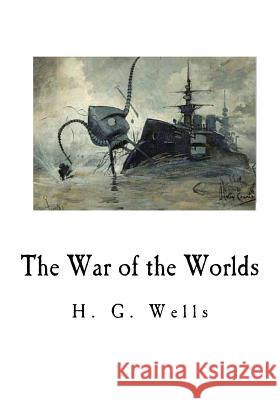The War of the Worlds » książka
The War of the Worlds
ISBN-13: 9781535336260 / Angielski / Miękka / 2016 / 116 str.
The War of the Worlds
ISBN-13: 9781535336260 / Angielski / Miękka / 2016 / 116 str.
(netto: 26,78 VAT: 5%)
Najniższa cena z 30 dni: 27,74
ok. 16-18 dni roboczych.
Darmowa dostawa!
The War of the Worlds by H. G. Wells. The War of the Worlds is a science fiction novel by English author H. G. Wells first serialised in 1897 in the UK by Pearson's Magazine and in the US by Cosmopolitan magazine. The novel's first appearance in hardcover was in 1898 from publisher William Heinemann of London. Written between 1895 and 1897, it is one of the earliest stories that detail a conflict between mankind and an extraterrestrial race. The novel is the first-person narrative of both an unnamed protagonist in Surrey and of his younger brother in London as southern England is invaded by Martians. The novel is one of the most commented-on works in the science fiction canon. The narrative opens in an astronomical observatory at Ottershaw where explosions are seen on the surface of the planet Mars, creating much interest in the scientific community. Later a "meteor" lands on Horsell Common, near the unnamed narrator's home in Woking, Surrey. He is among the first to discover that the object is an artificial cylinder that opens, disgorging Martians who are "big" and "greyish" with "oily brown skin," "the size, perhaps, of a bear," each with "two large dark-coloured eyes," and lipless "V-shaped mouths" which drip saliva and are surrounded by two "Gorgon groups of tentacles." The narrator finds them "at once vital, intense, inhuman, crippled and monstrous." They briefly emerge, have difficulty in coping with the Earth's atmosphere, and rapidly retreat into their cylinder. A human deputation (which includes the astronomer Ogilvy) approaches the cylinder with a white flag, but the Martians incinerate them and others nearby with a heat-ray before beginning to assemble their machinery. Military forces arrive that night to surround the common, including Maxim guns. The population of Woking and the surrounding villages are reassured by the presence of the military. A tense day begins, with much anticipation of military action by the narrator.
Zawartość książki może nie spełniać oczekiwań – reklamacje nie obejmują treści, która mogła nie być redakcyjnie ani merytorycznie opracowana.











